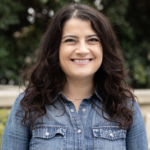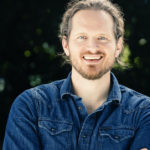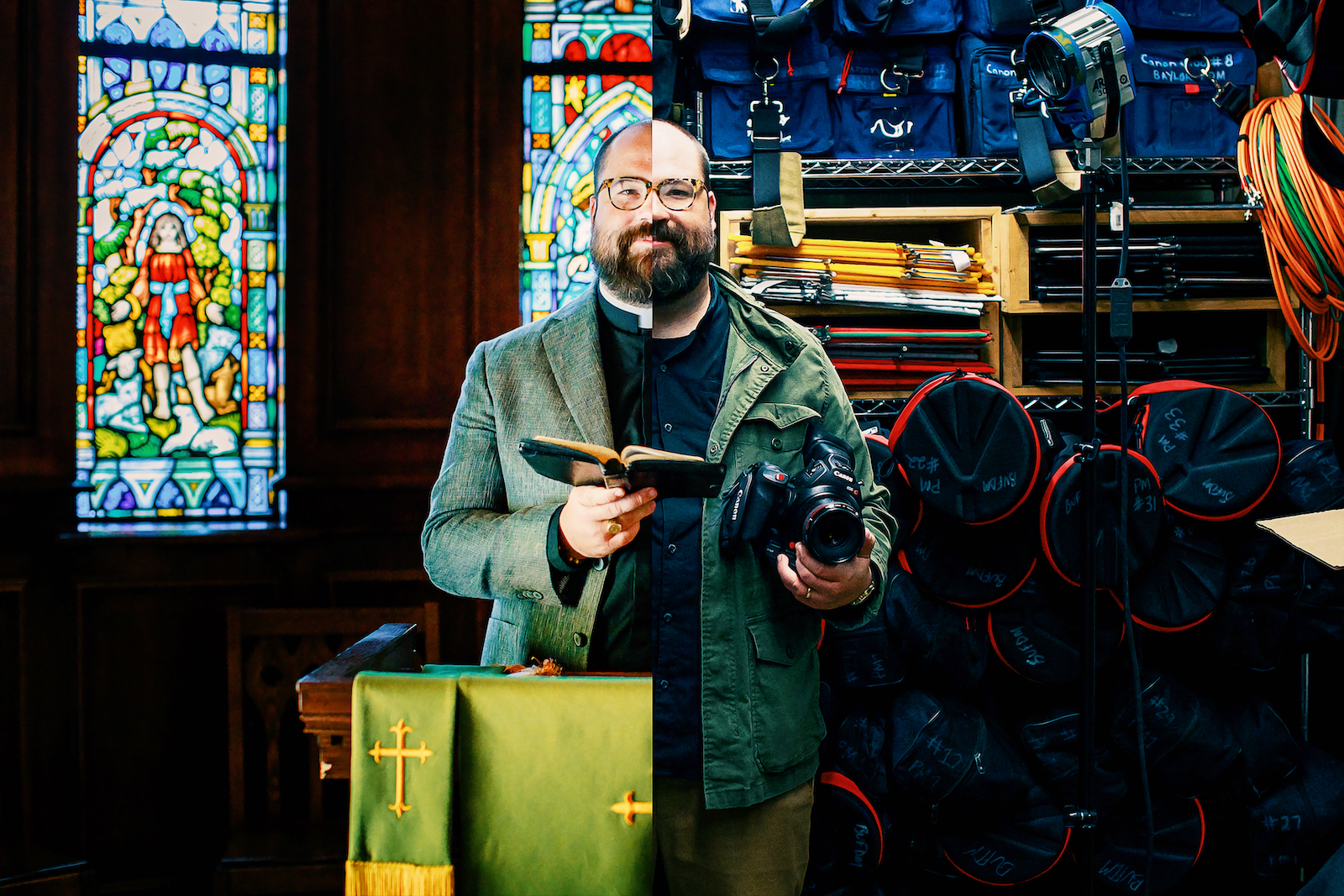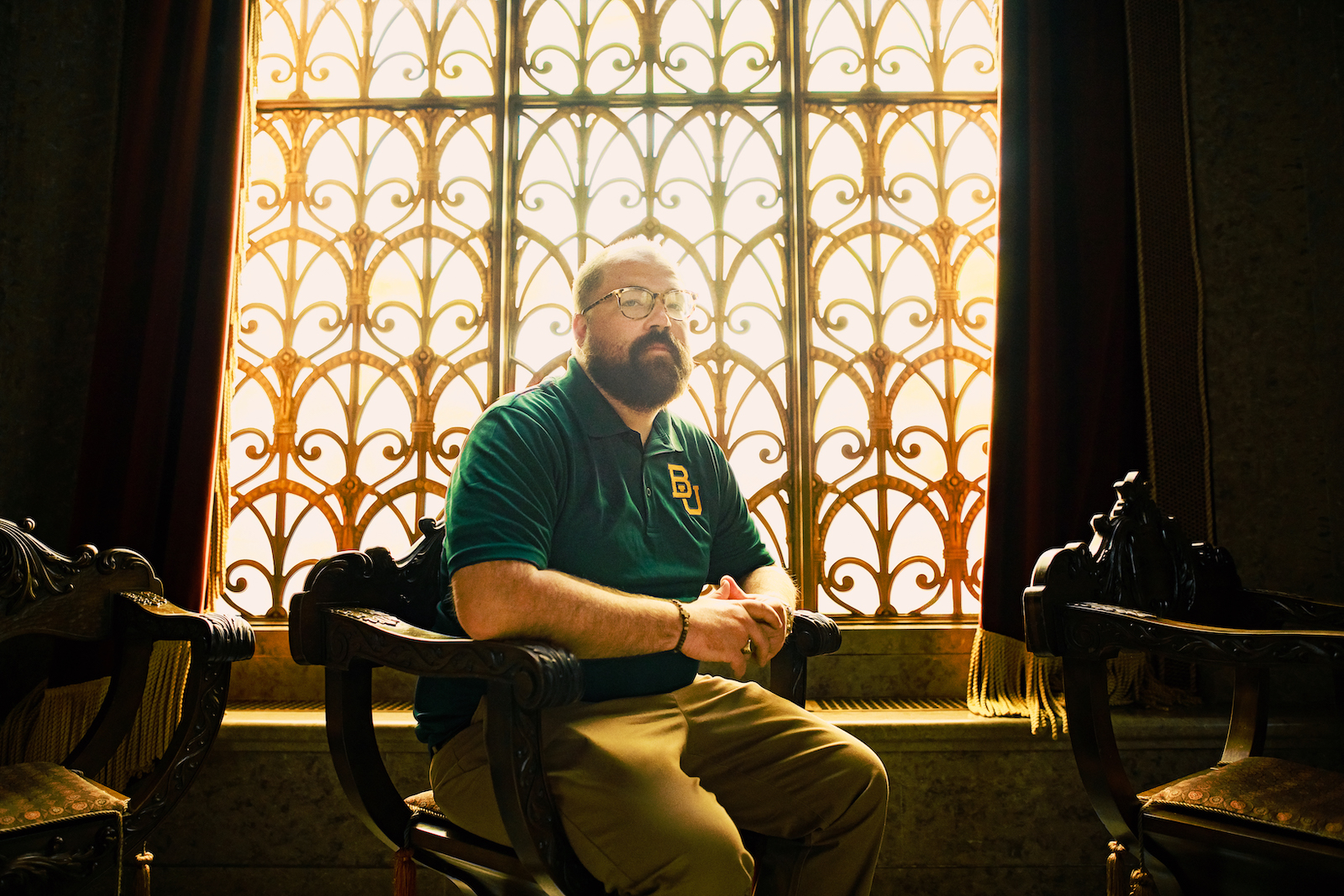
“The question I’ve struggled with my whole life is: Should I be a pastor or a filmmaker?” says Matthew Aughtry (MDiv ’16). “Since I was seven years old, my parents told me, ‘You should be a preacher.’ But also when I was seven years old, I saw Star Wars and thought, ‘I’m going to do that.’” After high school, Matthew found himself swinging from one end of his vocational spectrum to the other. First he leaned into his ministerial calling, attending a Southern Baptist college until, in the spring of his freshman year, he felt God say, “Thanks for putting Isaac on the altar. Now go study film.”
With a double major in media arts and film studies from his state university and a dream of moving to LA to make films someday, Matthew landed his “first real job” out of college as a videographer for a megachurch. “I thought, ‘This is it! I’m combining the pastor and filmmaking thing,’” he remembers. But after a while, he felt he needed to go deeper. “I was creating images to be used in worship, but I didn’t know how to do that faithfully. If you’re going to be a Baptist preacher, you can go read Charles Spurgeon. Just read somebody who has done it and done it well.” But Matthew wasn’t sure where to go to find similar role models for his own vocation mixing video, worship, and ministry.
“I googled ‘seminary and film,’ and obviously Fuller and the Brehm Center came up,” he says. Starting out with a six-course certificate program paid for by the church that employed him, Matthew says he immediately “fell in love” with his seminary experience and decided to move to Pasadena so he could complete an MDiv on campus. He still had the itch to make films, and he wondered if being so close to the center of the entertainment industry would eventually open doors for a filmmaking career. But once he was at Fuller, his pastoral calling came to the forefront as he immersed himself in his MDiv program. One day in Greek class, a friend turned to him during a discussion and made the offhand comment, “Oh, Matt, you’re such a pastor.” His first response, he remembers, was to resist, a feeling of, “No, I’m a cool filmmaking theological guy.” But Matthew knew, deep down, “Even though I was there to do theology and film, I couldn’t shake this pastoral calling, too.”

Joy Netanya Thompson (MAT ’12) is Fuller’s editorial director and senior writer.

Nate Harrison is the director of creative production, video, and photography at FULLER studio. Find more of his work at NateCHarrison.com.
“The question I’ve struggled with my whole life is: Should I be a pastor or a filmmaker?” says Matthew Aughtry (MDiv ’16). “Since I was seven years old, my parents told me, ‘You should be a preacher.’ But also when I was seven years old, I saw Star Wars and thought, ‘I’m going to do that.’” After high school, Matthew found himself swinging from one end of his vocational spectrum to the other. First he leaned into his ministerial calling, attending a Southern Baptist college until, in the spring of his freshman year, he felt God say, “Thanks for putting Isaac on the altar. Now go study film.”
With a double major in media arts and film studies from his state university and a dream of moving to LA to make films someday, Matthew landed his “first real job” out of college as a videographer for a megachurch. “I thought, ‘This is it! I’m combining the pastor and filmmaking thing,’” he remembers. But after a while, he felt he needed to go deeper. “I was creating images to be used in worship, but I didn’t know how to do that faithfully. If you’re going to be a Baptist preacher, you can go read Charles Spurgeon. Just read somebody who has done it and done it well.” But Matthew wasn’t sure where to go to find similar role models for his own vocation mixing video, worship, and ministry.
“I googled ‘seminary and film,’ and obviously Fuller and the Brehm Center came up,” he says. Starting out with a six-course certificate program paid for by the church that employed him, Matthew says he immediately “fell in love” with his seminary experience and decided to move to Pasadena so he could complete an MDiv on campus. He still had the itch to make films, and he wondered if being so close to the center of the entertainment industry would eventually open doors for a filmmaking career. But once he was at Fuller, his pastoral calling came to the forefront as he immersed himself in his MDiv program. One day in Greek class, a friend turned to him during a discussion and made the offhand comment, “Oh, Matt, you’re such a pastor.” His first response, he remembers, was to resist, a feeling of, “No, I’m a cool filmmaking theological guy.” But Matthew knew, deep down, “Even though I was there to do theology and film, I couldn’t shake this pastoral calling, too.”
Joy Netanya Thompson (MAT ’12) is Fuller’s editorial director and senior writer.
Nate Harrison is the director of creative production, video, and photography at FULLER studio. Find more of his work at NateCHarrison.com.


Lucky for Matthew, that was a year when an especially strong cohort of filmmakers was enrolled at Fuller, so he had a place to nurture both of his callings. As for the mentors he was seeking when he first came to seminary, he found “an embarrassment of riches” in staff, faculty, and friends of Fuller like Lauralee Farrer, Maria Fee, and Lee Isaac Chung, the latter of whom went on to be nominated for multiple Academy Awards for his 2020 film Minari. Between the community and the film courses, Matthew felt his sense of vocation bolstered. “There were so many people saying, ‘Yes, it’s right that you care about film and that you care about faith.’”
But after graduating, Matthew found himself living with his in-laws in Arkansas for half a year, unemployed and wondering why he went to seminary at all. After such a mountaintop experience at Fuller, he spent time in the valley of the shadow of doubt, wondering if he would ever find a job that combined his two callings. David Taylor, associate professor of theology and culture, had some wisdom to offer Matthew. “Just because you’re a lot of things,” Dr. Taylor told him, “doesn’t mean that everything’s at the forefront all the time.” They discussed the idea of one aspect of Matthew’s vocation keeping rhythm while the other played the melody. It’s a metaphor that served Matthew well as he looked back over his life and saw how it had already been true. “I could see that there were seasons when the pastor’s playing the drums so that the filmmaker can take a cool guitar solo—and there’re other seasons where they’re flipped.” Such a framework gave him peace when he accepted a job at Baylor University in Waco, Texas, as a videographer in their marketing department. He wasn’t doing ministry, per se, but Matthew found meaning in creating videos about faculty and university-sponsored studies. “I was championing vocation.”
When Matthew took a different job at Baylor, working with the spiritual life team to livestream the main weekly chapel services, he had no idea that soon he’d have the chance to step into both of his callings at once. Gearing up for the fall semester in 2020, the chapel team knew the pandemic would make it impossible to host several “Big Chapel” services a week, as they called the main program that drew 1,000 to 1,500 students per service. But instead of playing a normal chapel service to an empty room and livestreaming it to students, Matthew had an idea: Could they creatively use film and video to engage students in spiritual practices in a deeper way than ever before? To his surprise, his supervisors told him to run with it.
Suddenly he was “in a place where my job drastically changed, where I’m relied upon to be a minister, to be thinking theologically and liturgically about film and video.” His first step, Matthew knew, was to establish a theme to frame the whole year of programming. A recent survey had shown low levels of biblical literacy in Baylor’s undergraduate students, so the obvious choice was to start in the beginning, with Genesis. They invited speakers to touch on topics that related to the chosen Scripture portion for the week, and instead of simply “setting up a camera in the back of the room,” they produced curated videos that leaned into the medium of digital technology to engage students.
But when it was time to plan the spring semester, when they would cover the New Testament and the life and person of Jesus, Matthew dove all the way into his filmmaking passion. He asked, “What if we didn’t start just by talking about Jesus, but instead told the stories he told, and in an engaging way that really makes people think?”


In a burst of creative inspiration, Matthew quickly wrote screenplays for six original short films based on six of Jesus’ parables. “I didn’t realize we were doing it at first, but each film was a different genre,” he says. For example, the parable of the unforgiving servant was done in the style of a mob movie. “Ever since I was young, when I heard that story I thought, this is a mob story, a gangster story,” he says. The parable of the hidden treasure was done in the style of a sports film—and happened to be the most popular with students—while the parable of the sower was Matthew’s foray into arthouse, experimental cinema, and also garnered a surprising amount of positive feedback. Other films turned the parables on their heads in different ways, like Matthew’s version of the story of the prodigal, which followed a mother and her two daughters, the younger of which moves to LA and documents her wild exploits on Instagram.
Not only was the filmmaking and creative license a dream come true for Matthew, the pastoral effect the films had on students was satisfying as well. A small group gathered in person to discuss their favorites and the impact it had on them, while more personal emails trickled in when Matthew needed them most. “Almost every time I was too tired, some student somewhere would say, ‘This really connected with me,’ and I could keep going.” One email in particular stands out. “There was a student who said, ‘I was thinking of walking away from the faith, and I still don’t even know if I’d call myself a full-fledged follower, but chapel was the thing that kept me from closing the door.’” Matthew was moved, but not surprised. “This is the thing that art can do,” he says. “It opens up a lot of possibilities. It opens up more things than it closes down.”
Another email came in following the release of the prodigal film featuring a mother and her two daughters. That student said, “I got it in a way I never got it before.” Responses like these were what made Matthew feel that he really was pastoring. “I mean, I’m preaching sermons through film. That’s what I wanted to do. That’s why I went to Fuller . . . to learn how to do that faithfully.”
While the intense creative output took a lot out of him—“I was firing on all cylinders, but I was running myself ragged,” he says—he’s quick to express gratitude for having unexpectedly fallen into his sweet spot balancing his two vocations. “I definitely had moments this past year, and the parable films were the pinnacle of that, where I thought, ‘I can’t believe I’m doing what I’m doing and this is my job,’” he says. “And that I was ready to say yes when we had to radically shift the way we’ve done chapel and make it online. I was as prepared for this as anyone could be.”
Looking back on his time of preparation at seminary, Matthew says, “Fuller was the perfect place for me because that’s where I realized that I wanted to continue to serve the church—it wasn’t enough to be a cool filmmaker who’s theologically informed.” But Matthew knew he also didn’t just want to “show a movie to my youth group and be able to talk about it theologically.” He wanted to serve the church with film, “but I didn’t know what that meant.” Three years later, he says, what he’s doing right now at Baylor “is exactly what I hoped would happen.”
As for that question he’s always trying to figure out, “Am I a pastor or am I a filmmaker?” Matthew sees now that “every step of my life, there’s never been a ‘you’re this or you’re that,’” he says. “There’s just been a yes.”
With his heart for the stories of others and the story of Scripture, Mark Fields seeks to break down barriers and cultivate the connections that exist among all of us.